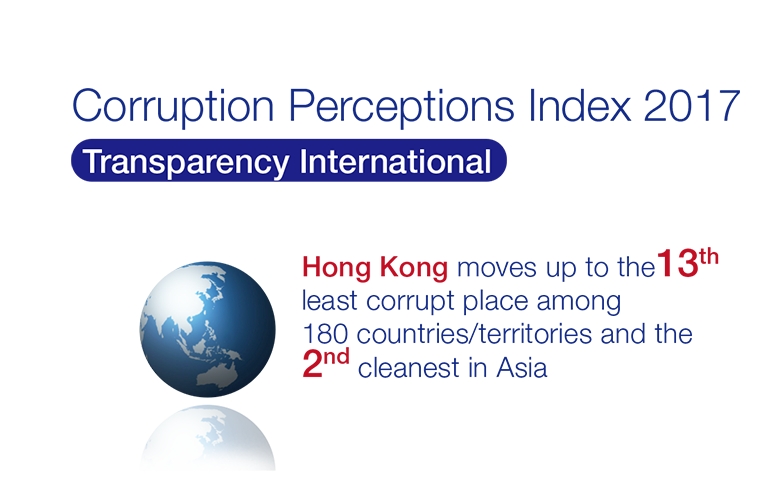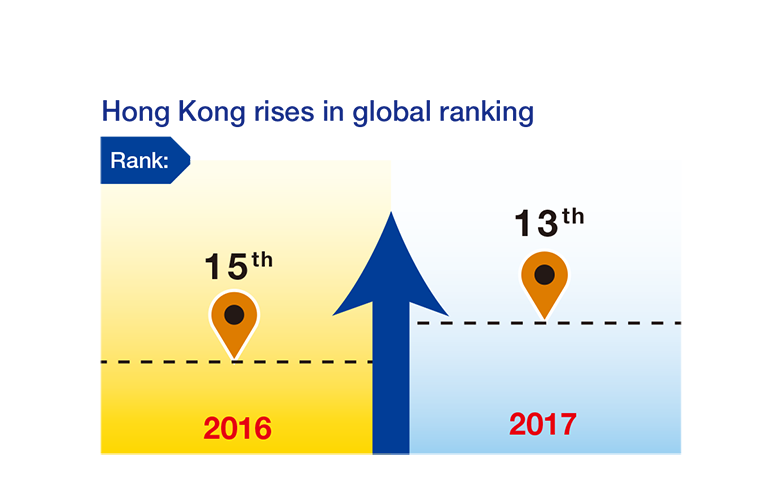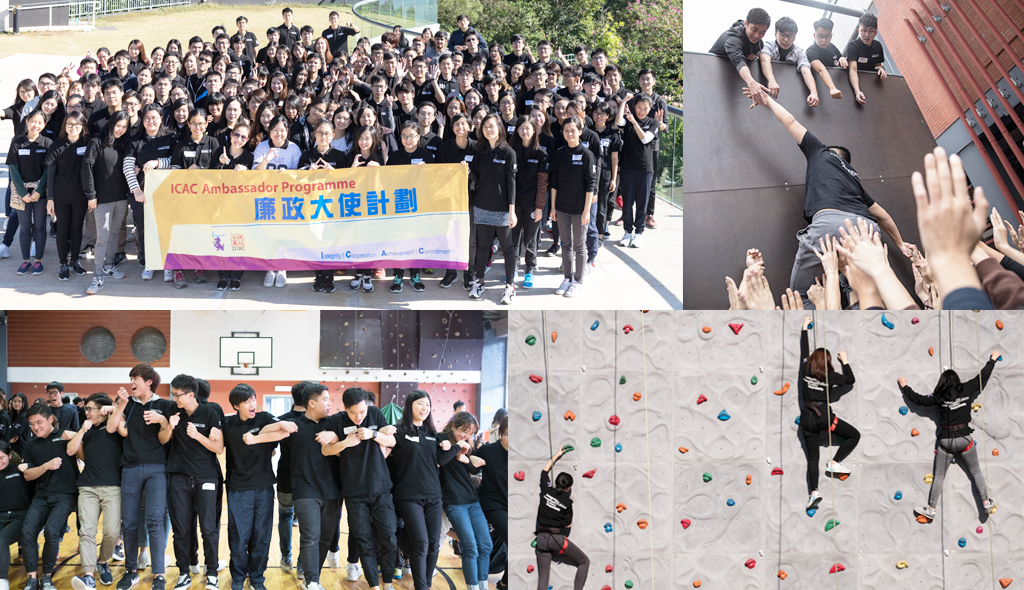專員隨筆
Commissioner Online
Towards 45 years of anti-graft work


Year 2018 is of great significance to the ICAC. The Year of the Dog heralds a new era of graft fight as the Commission approaches its 45th anniversary. Recent findings of international and local surveys further affirmed that the culture of probity is deeply rooted in Hong Kong. Our anti-graft work was well recognised by the international community and was widely supported by local citizens.
In the 2017 Corruption Perceptions Index released by international anti-graft watchdog Transparency International last month, Hong Kong was ranked the 13th least corrupt place among 180 countries/territories, two places up from the ranking in 2016 while maintaining the same score of 77.
Meanwhile, Hong Kong was ranked the freest economy in the world for the 24th consecutive year by the latest Heritage Foundation's Index of Economic Freedom. The report recognised the city's performances in various aspects, including our economy, judiciary and government. It also praised Hong Kong for its low tolerance for bribery as well as having an excellent track record in combating corruption. In terms of "government integrity", Hong Kong's ranking also advanced two spots to the eighth.


Locally, the 2017 ICAC Annual Survey commissioned by the ICAC and conducted by an independent pollster summed up the actual probity situation of Hong Kong.
The survey found that almost all respondents or 99.1% said they had not personally come across corruption in the past 12 months. Only eight out of 1,500-odd citizens polled or 0.6% said they did. The majority (78%) indicated that they would report corruption to the ICAC should they come across it.
The findings bore testimony that corruption in Hong Kong remained well under control and the city enjoyed staunch support from the public in its anti-graft work. An overwhelming majority (96.8%) said the anti-corruption work of the ICAC deserved their support. The public generally believed the Commission would be able to maintain a corruption-free society, uphold fairness and justice and crack corruption cases successfully. As such, the ICAC will continue to pursue all corruption cases without fear or favour and in accordance with the law, so as to safeguard Hong Kong's reputation as one of the cleanest places around the world.

It is also worth mentioning that almost all respondents (99.2%) considered keeping Hong Kong corruption-free was important to the overall development of Hong Kong. They believed that a clean society would help attract foreign investments and facilitate sustainable development of the society. A clean civil service and a level playing field for business have been Hong Kong's competitive edge in which we all take pride. The ICAC will continue to promote integrity and enhance corporate governance in both the public and private sectors.
Given the importance of listed companies to Hong Kong's economy and the substantial investors' interest involved, the ICAC has all along attached great importance to corruption prevention initiatives in the field. Through the Conference on Business Ethics for Listed Companies held last year, the Community Relations Department (CRD) appealed for the support of over 500 corporate leaders and professionals in enhancing ethical leadership and corporate governance.
This year, the CRD will continue to reach out to all listed companies and relevant professional bodies under the Ethics Promotion Programme for Listed Companies. The department will also organise training on ethical governance for company directors and related professionals, using case studies, tailor-made training packages and practical guides, and provide corruption prevention advice for them.
Meanwhile, the Corruption Prevention Department will step up in providing preventive advices to private organisations through a cross public-private sector strategy, including areas where grantees in subvention schemes and contractors of works projects are involved. To ensure that public funds are properly used, it is important for public organisations to require those private enterprises, through contractual and funding arrangements, to abide by probity provisions, guidelines on open procurement, and to put in place effective internal controls.
Youth integrity education is another key component of our anti-corruption initiatives. Findings of the ICAC Annual Survey consistently showed that young people were slightly more tolerant to corruption when compared with respondents of other age groups. This may be attributed to the fact that the younger generations have not been exposed to the bad old days of rampant corruption. They may also be less vigilant because they have yet to enter the work force.
The CRD will continue to implement the two-year "Youth Integrity Fest" so as to nurture the core value of integrity among young people. The all-embracing programme comprises campus activities, multimedia productions and a large-scale youth highlight event.

Anti-corruption has become a keen concern of many governments. However, as Transparency International pointed out when it released the 2017 Corruption Perceptions Index, despite attempts to combat corruption around the world, the majority of countries were moving too slowly in their efforts. Hong Kong's anti-corruption model may not be a universal solution as every country/territory needs to come up with a suitable strategy, taking account into its own legal system and social development. Nevertheless, the ICAC, being a front runner in the anti-corruption cause, will be more than happy to share with the international community Hong Kong's successful experience in weeding out corruption. In fact, under the United Nations Convention against Corruption (UNCAC), the ICAC has been designated by the Central People's Government as the agency in Hong Kong to assist other State Parties in anti-graft capacity building.
The ICAC's Centre of Anti-Corruption Studies, which was established in 2009, was renamed as the Centre of Anti-Corruption Studies and International Training in early February to reflect its new role. Dedicated officers have been deployed from the three departments to the unit to help other anti-corruption agencies to identify training needs and provide them with training assistance on the basis of mutual consent.
At an exchange session held in early February, the services of the Centre of Anti-Corruption Studies and International Training were introduced to over 50 consul generals and consuls in Hong Kong, who could act as a bridge between the ICAC and their respective governments and anti-corruption agencies in strengthening liaison. As the "Belt and Road Initiative" calls for deepening international cooperation and expanding economic ties, the ICAC is geared up to provide consultancy services and tailor-made training for countries along the route. With experience spanning over 40 years, the ICAC believes that it has an active as well as positive part to play. On top of fulfilling the obligation under the UNCAC, the ICAC can also make an even more significant contribution to the international community in the battle against corruption.
Marching towards its 45 years, the ICAC will continue to discharge its duties with outmost professionalism to keep Hong Kong corruption-free and share our experience with the international community.

ICAC Commissioner
